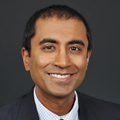Physician Shares Experience with Doctors Without Borders
 Palaniappan Muthappan, MD, FACC, is an interventional cardiologist at Miami Valley Cardiology.
Palaniappan Muthappan, MD, FACC, is an interventional cardiologist at Miami Valley Cardiology.
After completing his residency in internal medicine at Johns Hopkins Hospital, Dr. Muthappan worked for Médecins Sans Frontières (Doctors Without Borders) running a hospital and outpatient clinic and starting a TB program at a refugee camp between government- and rebel-held territory in Sudan. He first served for about 10 months from 2009 to 2010, and returned on an emergency basis a year later, serving then for about two months.
While you were there, what were you working on?
A: I was there as a generalist, working in what could loosely be called a refugee camp, or right outside a refugee camp. However, the people of the region are so poor that it was hard to tell who was a refugee and who wasn’t, because everyone was just so impoverished.
We had what was meant to be a small hospital, but ended up being kind of a medium to large hospital just because of the number of patients we needed to see. My main focuses during the first mission were running a pediatric malnutrition refeeding program, and then we started a tuberculosis treatment program. However, we were the only medical facility within a large radius (maybe several hundred miles) with medicines and staff, so we tried to take care of whoever came in.
The second time, were you doing the same work?
A: The second time, the town of Abyei (which was where our initial mission was based) had been shelled and burnt to the ground, so the townspeople fled. We were trying to find pockets of hundreds or thousands of people and provide them with the basics – food and cooking implements, chlorine tablets, blankets, tarps, and basic medical care. You get out there, and they don’t have any clean water – if they have access to water at all. The villages themselves don’t have much clean water, especially in dry season, and there can sometimes be contamination of the water supply. So when you add a refugee situation on top of that, the village can share with refugees; but if they don’t have enough for themselves, then everyone’s going to be worse off than they were before.
What prompted you to get involved with Doctors without Borders?
A: It just seemed like the right thing to do. It’s something I had thought of doing for a long time, and my thought was, if someone’s going to do it, then it better be someone who is young, who doesn’t have kids. If I had gotten hurt, the people who would have mourned me would have been my immediate family, just my parents and my sister. Now, I’ve got young children depending on me, so I'll stay out of danger for a while.
What did you think of your experience?
A: It was a lot of work – we ran an average census of probably about 100 patients, and I was the only physician for much of the time. I did have some very dedicated staff helping, too. But still, it was just about focusing on getting the work done. I think when you see that much need, you kind of just react to it as opposed to philosophizing about it. So, I was just focused on, “Here’s the next patient; here’s what they need; let’s get it done.”
Did you learn anything culturally from being in the area?
A: I picked up a fair amount of Arabic while I was there; I picked up some Dinka when I was there. Culturally, they have beautiful traditions that make sense when put into the context of the place where they live, and the food that they eat. For example, the Dinka (one of the main populations that we were treating) are a cow-herding people, and so all their wealth is measured in terms of the number and the quality of the cows they own. It’s fascinating.
What would you say to other physicians contemplating serving abroad?
A: I would say there’s a huge need. The diseases I saw were diseases that I had only read about here; but the training is good, and the treatments are nicely protocolized. So if someone’s interested, they shouldn’t let a lack of familiarity keep them from doing it. There is a need for physicians, nurses, and pharmacists, but also finance people (someone has to handle payroll for local staff) and logisticians (people with a background in trades, who can help with electrical work, sanitation, construction). There’s such a need that lack of experience won’t be a barrier for someone if they’re committed to it.
Premier Health recognizes that many of its physicians have served in the international medical field, whether through research, medical missions, or other opportunities. The time that our physicians spend working around the world underscores more than their compassion for and dedication to serving those who are less fortunate. Their exposure to cultures and medical challenges around the globe also enriches them and enhances the care that they provide to patients and families here in Southwest Ohio, which advances Premier Health’s mission to build healthier communities.
Premier Health values the benevolent spirit of our physicians, and we intend to highlight their international pursuits through personal essays and interviews as a recurring feature in this publication. If you would like to share your experience serving as a physician outside of the United States, or if you know of someone who might have an inspiring story to tell, please reach out to Ben Sutherly or Sarah Zoellick.
Back to the May 2018 issue of Premier Pulse

